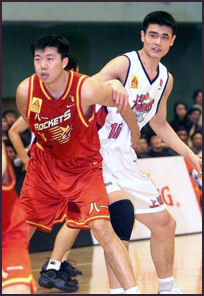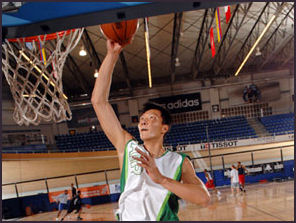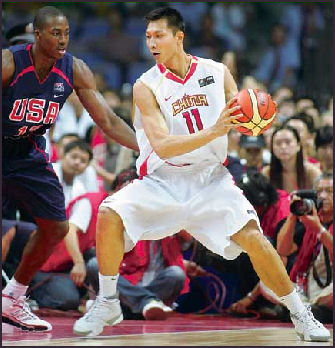TALL PEOPLE IN CHINA
 American college coach Dale Brown asserted that there are more than 100 seven-foot basketball players under the age 24 in China's sports schools and local basketball clubs. "Something is not right when a nation of midgets is producing more 7-footers than any other country in the world," Brown said and then went on to suggest that something sinister may be at work, such as athletes being given human growth hormone or fetuses undergoing genetic engineering:
American college coach Dale Brown asserted that there are more than 100 seven-foot basketball players under the age 24 in China's sports schools and local basketball clubs. "Something is not right when a nation of midgets is producing more 7-footers than any other country in the world," Brown said and then went on to suggest that something sinister may be at work, such as athletes being given human growth hormone or fetuses undergoing genetic engineering:
Many Chinese believe they don’t have the innate skill of African-American and European players and thus have to make up for their lack of innate ability with height and shooting skill. For a while the Chinese experimented with a 4-point-shot as a way of improving their shot making.
The average height of the Chinese male is 5 foot 6 inches. But Chinese are getting taller. The average Chinese child in six centimeters, or around two inches, taller and three kilograms or seven pounds heavier than 30 years ago according to the Chinese Health Ministry. The increases have largely been attributed to improved health and nutrition.
There are now many Chinese over six feet tall and some over seven feet. Tallness in China seems to be a good example of the saying if you are one in a million in China there are a thousand others just like you. For a while a 2.36-meter-tall Chinese man named Bao Xishun was listed by Guinness Book of Records as the world’s tallest man.
When foreigners visit Beijing they are often surprised by how large the people are there. One sports agent told Sports Illustrated, "If foreigners think the Chinese people aren't big, it's because for years they've seen only people from Guangzhou or Hong Kong. It’s true that south of the Yangtze River most people are short. There they say to big guys — they call them 'long guys' — 'You’re wasting clothes!" But people north of the Yangtze can be very big."
BASKETBALL IN CHINA Factsanddetails.com/China ; NBA IN CHINA Factsanddetails.com/China ; CHINESE BASKETBALL IN PLAYERS Factsanddetails.com/China ; YAO MING Factsanddetails.com/China
Websites and Sources: Wikipedia article on Chinese Basketball Wikipedia ; Asia-Basket.com asia-basket.com ; Yao Ming Foundation theyaomingfoundation.org
Tall Basketball Chinese Players in the U.S.
Four Chinese players have played in the NBA as of the mid 2000s. Three have been very tall centers: 7-foot-6 Yao Ming, 7-foot-1 Wang Zhizhi and 7-foot Mengke Bateer. Sometimes referred to as the "Walking Great Wall," the three men played together on the Chinese national team at the 2000 Olympics. Yi Jianlian, the forth player, is 7-foot a power forward.
The tallest player in professional basketball history is Sun Ming Ming, a 2.36 meter (7-foot-9-inch) tall, 175 kilograms Chinese player with hands so enormous that he can catch a ball with one hand and make a jump shot with the other. His extraordinary height is due to a pituitary gland condition which also affects his health, and may keep him from playing in the NBA and being the tallest player in NBA history. It may also kill him.
Sun signed with the Maryland Nighthawks of the ABA in 2007. Raised in Bayan China, he began playing basketball when he was 15 and six-foot-10-inches. He arrived in the United States in 2004 with ambitions to play in the NBA and was diagnosed there with a pituitary-gland disorder called acromegaly. In 2005 he had had surgery to remove a benign tumor in the gland. It is not clear what the results will be. NBA teams are reluctant to take a risk on him.
Sun is three inches taller than Yao Ming. He once said “I hope to make it big.” Scouts doubt of he will play in the NBA. One told Sports Illustrated. “He’s horribly slow. He can’t move laterally. He has bad hands. Guts shoot lay ups over him because he can't get his arms up fast enough.” On his debut he scored eight points and had three blocked shots.
Wang Zhizhi
Wang Zhizhi, a 7-foot-one-inch center from Beijing, was drafted by the Dallas Mavericks in the second round in 1999 to become the first Chinese player to play in the NBA. The son of two former basketball players, he can dunk from all directions, make three point shots and does a sky hook.
Wang played for the Bayi Rockets, the team sponsored by the People’s Liberation Army, and was officially a regimental commander in the PLA when he played. Wang helped lead his team to six CBA championships. Initially generals in the PLA refused to let Wang join the NBA.
Wang and Yao Ming reportedly do not get along. Wang angered the Chinese basketball federation when he failed to return to China to prepare for the 2002 world championships. He was not allowed to play in the 2004 Olympics. Chinese basketball fans hope that he will back at the 2008 Olympics.
Wang Zhizhi refused to honor his commitment to the national team. He failed to show up at tournaments in the summer and fall of 2002 and was kicked off the team. After five mediocre NBA seasons his U.S. visa was revoked. In 2006, with the Olympics just two years away, he publically apologized to all of China and was reinstated on the national team.
Wang Zhizhi in the NBA
Dallas spent two years trying to get permission from Bayi, the PLA, CBA headquarters and Shanghai municipal sports commission to sign Wang. Mavericks owner Ross Perot Jr., son of H. Ross Perot, personally flew to Beijing to cajole the Beijing team to give him up. Finally in 2001 a deal was worked out that gave both the Mavericks and China a piece of him.
After scoring six points in his eight minute debut with the Mavericks, Wang said he was happy: "It means that I can score on the N.B.A. floor." Later he was honored with "Wang Zhishi Day" in San Francisco and appeared on a highly sought after trading card. In the middle of the season with the Mavericks, he was summoned to China to play in Chinese National Games.
After his second season in the NBA, Wang refused to go home and became involved in a complicated lawsuit when he said he wanted to return to China. He was dropped by the Mavericks and picked up by the Los Angeles Clippers, for $2 million a year. Afterwards Clippers games are banned in China. Wang then left the NBA and made a come back in the Chinese leagues. As of July 2007, one Italian team and three NBA teams were courting him.
Yi Jianlian

Yi Jianlian, a star power forward with Guangdong Tigers, was picked number 6 in the first round of the NBA draft in 2007 after impressing coaches during training sessions in Los Angeles. He was chosen by the Milwaukee Buck but didn’t sign with them until several months after the draft. When he did he signed a standard rookie scale contract.
The deal was made with Yi, his family, his agent, his Chinese team and Chinese sports officials. It was not clear why a deal was so long in the making. There was some talk that he wanted to be traded to a team in a city with a large Asian population. Some in China said that Milwaukee was not a good team for his development as a player for the national team in the 2008 Olympics.
Yi has soft hands and an athletic body. He has a sweet shot form the wing and has the ability to run the court. He played with the national team in the 2004 Olympics and the 2006 World Championships. Most regard his skills and his English as better than Yao’s before he played in the NBA.
Yi Jianlian Early Life
Dubbed “Little Yao Ming,” Yi is 2.3 meters tall and is from Shenzhen. Both his parents were team handball players. His 5'8" mother played for the Chinese national team. His father is 6'5". Both are now postal workers. Yi started playing basketball in the first grade. He was singled out because he was tall at an early age. He told Sports Illustrated, “I wasn’t very good. But I loved it and I didn’t play other sports. After grade school the government put me in a sports school.”
At his sports school Yi said, “I lived in a dorm with four or five guys and one bathroom. We had classwork from 8 to 11:30. I didn’t like classes. Basketball training was a lot of running and team-oriented drills. It was tough. The first time I did the 400-meter run I couldn’t finish. I was so upset I wanted to quit. If someone doesn’t perform there, they are asked to leave.”
Yi was almost seven feet tall when he was16 and touted at that time as a future NBA star. At 18 he showed a range of skills but was still quite thin and needed to bulk up if he wanted to play in the NBA. He averaged 24.9 points for Guangdong in the 2006-2007 season and lead Guangdong to three tittles in four years. There were questions about his age in 2007. Some said he was 19; others said he was 22.
In China Yi is mobbed by fans. Sometimes he says people wait outside his hotel all day to see him and chase him down the street, seeking his autograph. He likes hip-hop, Hollywood films and wants to buy a Range Rover.
Yi Jianlian in the NBA

Yi said he grew up watching the NBA on television and loved the atmosphere when he got to see a game in person when the Chinese national team visited the United States in 2002.
Yi Jianlain showed up for practice with the Bucks in mid October. His coaches said there were no guarantees of playing time and their primary goal, they said, was to develop him into a first rate player. Yi got off to slow start and admitted that playing in the NBA was tough and the pressure was getting to him. In one early game he fouled out in 16 minutes, managing only three points, two steals, a blocked shot and a turnover.
In November 2007, Yi and Yao Ming faced each other for the first time. An estimated 200 million Chinese tuned in to watch the game live on television in China even though it was broadcast in the wee hours of the morning. In comparison the Superbowl in the United States draws an average audience of 93 million. Yao proved to be the better man. He had 28 points, 10 rebounds and three assists to Yi’s 19 points and nine rebounds in 114-88 victory by the Rockets over the Bucks.
Yao and Yi play on the national team together. Yao said the first time he saw Yi play he knew that Yi would be an impact player in the NBA. After their first meeting he said, Yi’s “talent is unbelievable. You ask me how good he can be? I can’t say that. But I’ll think he’ll be better than me.”
More than 200 million Chinese tuned in to watch the second showdown between Yi Jianlian and Yao Ming, in Milwaukee . What they saw was not impressive, Yi went 1 for 10 from the field, Yao had only 12 points and did poorly on defense but he did have a team-high 12 rebounds. The Rockets beat the Bucks 91-83.
Yi Jianlian was traded to the New Jersey Nets before the 2008 season. He played for the Washington Wizards in 2011. Yi, the 2.02-metre forward, is China's great NBA hope after superstar Yao announced his retirement in July 2011
Other Top Chinese Basketball Players
Menk Bateer plays for the Denver Nuggets. He was picked to be a basketball played at the age of eight, when the mayor of his town visited his school and mistook him for the teacher. Liu Wei plays for Sacramento. At the 2004 Summer Olympics in Athens he made the newspapers by yelling English cuss words at his own coach. Another Guangdong Tiger player — point guard Chen Jianghua — is regarded as good enough to play n the NBA.
A Chinese guard named Ma Jian played at the University of Utah for two years. In 1995, a was the last player cut from the Los Angeles Clippers. When he entered the sport there were no Asians in the NBA. He told the New Yorker, “The first time I stepped onto the team...I saw the blacks sitting on one side and the whites on the other. I looked at myself’should I go on the brothers’ side or the whites’ side?”
Sun Yue, a 2.06-meter-tall point guard, has a multi-year contract with the Lakers. He averaged 6.8 points, 1.7 rebounds, 2.5 assists and 1.33 steals in six games with China in the Olympics in 2008. Sun played for the Beijing Aoshen Olympians of the American Basketball Association for three seasons and was a first team All-ABA selection each of the last two years. He was the Lakers’ second round draft pick in 2007.
Former NBA All-Star Steve Francis played with the Beijing Ducks. At one point there were reports he had left the team while teams said the reports were untrue.
Image Sources: Ohio State University, CCTV, NBA, AFP, UCLA Asia Institute, Nike
Text Sources: New York Times, Washington Post, Los Angeles Times, Times of London, National Geographic, The New Yorker, Time, Newsweek, Reuters, AP, Lonely Planet Guides, Compton’s Encyclopedia and various books and other publications.
Last updated April 2012
